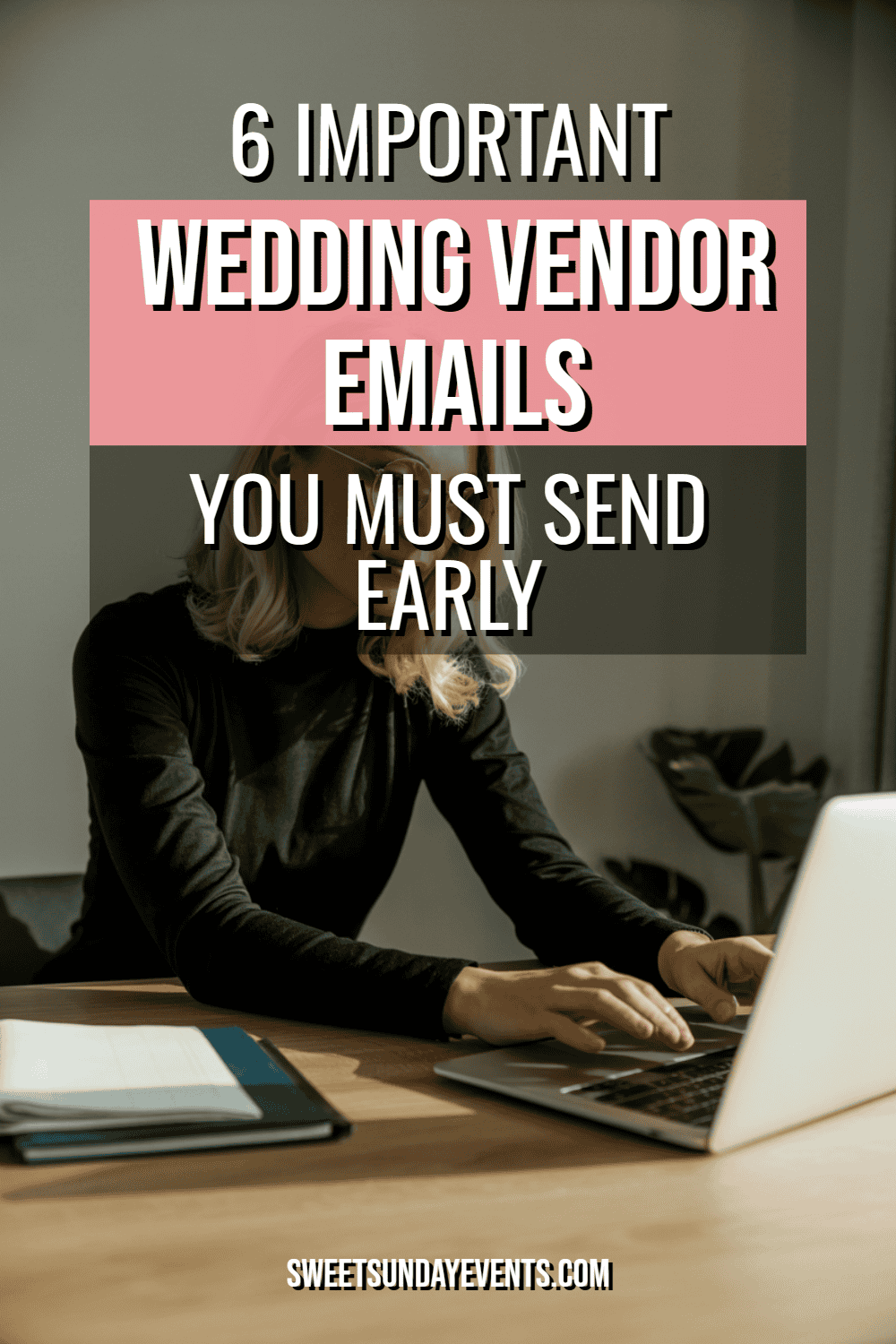Your wedding vendors aren’t mind readers, despite what their Instagram feeds might suggest. Getting ahead of the communication game can mean the difference between a seamless celebration and a day filled with preventable hiccups.
These six emails will set you up for success, reduce last-minute stress, and help you build stronger relationships with your vendor team from the start.
1. The “Here’s My Vision” Email
Send this email within a week of booking each vendor. Your florist needs to know you’re dreaming of wild, asymmetrical arrangements, not tight rose balls. Your photographer should understand you want candid moments over posed perfection.
Create a simple mood board or Pinterest collection to share alongside your written description. Words like “rustic” or “elegant” mean different things to different people, but visuals speak a universal language.
Include practical details that affect their work. Mention if your ceremony is outdoors (lighting considerations), if you have mobility-impaired guests (accessibility planning), or if your venue has specific restrictions they should know about.
Don’t apologize for having preferences or worry about seeming too demanding. Vendors want this information—it helps them deliver exactly what you’re envisioning and prevents costly misunderstandings later.
2. The “Let’s Talk Timeline” Email
Wedding day timelines affect every single vendor, yet couples often treat this as an afterthought. Send this email at least four months before your wedding, earlier if you’re planning during peak season.
Start with your non-negotiables: ceremony start time, cocktail hour length, and when you absolutely must leave for your honeymoon flight. Build everything else around these fixed points.
Ask each vendor how much time they realistically need for their services. Your hair and makeup team might need four hours, while your florist needs venue access two hours before guests arrive. These requirements will shape your entire day.
Share this timeline with all vendors simultaneously. Your photographer needs to know when the florist will finish centerpieces, and your caterer needs to coordinate with your rental company for table setup.
3. The “Payment Schedule Clarity” Email
Money conversations feel awkward, but unclear payment expectations create unnecessary stress. Send this email immediately after signing contracts to confirm everyone’s on the same page.
Confirm exact payment amounts, due dates, and accepted payment methods. Some vendors prefer checks, others use digital payment systems, and a few still operate cash-only for final payments.
Ask about their policy for day-of payments or tips. Will your wedding planner handle gratuities, or do you need to prepare individual envelopes? Should final payments happen before the wedding or on the day itself?
Document everything in writing. A simple email reply confirming “Yes, final payment of $500 cash due on wedding morning” prevents awkward conversations when you’re trying to get ready.
4. The “Emergency Contact Information” Email
Weddings rarely go exactly as planned, and when issues arise, you need direct lines of communication. Send this email two months before your wedding with a comprehensive contact list.
Include your phone number, your partner’s number, and designate a point person (wedding planner, maid of honor, or responsible family member) who can make decisions if you’re unreachable during getting-ready chaos.
Provide venue contact information, including after-hours numbers if your wedding is on a weekend. Add your officiant’s contact details and any other vendors who might need to coordinate directly.
Ask for their emergency contact information in return. If your florist gets sick on wedding morning, you need to know who else at their company can step in or problem-solve.
5. The “Special Circumstances” Email
Every wedding has unique elements that vendors need to know about well in advance. Send this email as soon as you’re aware of any special considerations, ideally at least two months out.
Dietary restrictions go beyond “vegetarian option available.” If your flower girl is severely allergic to certain blooms, your florist needs specific guidance. If religious or cultural traditions require particular timing or setup, share detailed explanations.
Family dynamics sometimes affect vendor interactions. If divorced parents need to be kept separate for photos, or if certain family members shouldn’t be included in specific shots, communicate these boundaries clearly and kindly.
Weather contingency plans deserve their own discussion. Outdoor weddings need detailed backup scenarios, and even indoor celebrations can be affected by severe weather impacting vendor arrival times.
6. The “Final Confirmation” Email
Two weeks before your wedding, send a comprehensive confirmation email to every vendor. This isn’t micromanaging—it’s professional event coordination that prevents day-of disasters.
Confirm arrival times, setup requirements, and any last-minute changes to guest count or timeline. Include venue addresses (even though you’ve shared them before) and parking instructions for vendor teams.
Attach your final timeline, seating chart, and any other documents they might reference during your wedding. Make sure contact information is current and that payment arrangements are crystal clear.
Ask each vendor to confirm receipt of this email and acknowledge that all information is accurate. A simple “Confirmed—see you Saturday!” gives you peace of mind and creates a paper trail.
Creating Your Communication Strategy
Effective vendor communication isn’t about sending more emails—it’s about sending the right information at the right time. Create a simple spreadsheet tracking which emails you’ve sent to which vendors and when follow-up is needed.
Set calendar reminders for each email type so nothing falls through the cracks during busy planning periods. Consistent communication builds trust and demonstrates that you’re organized and respectful of their time.
Keep your emails concise but complete. Vendors are busy professionals who appreciate clear, actionable information over lengthy explanations or excessive enthusiasm.
Making It All Work Smoothly
The couples who have the smoothest wedding days aren’t necessarily the ones who spend the most money—they’re the ones who communicate clearly and early with their vendor teams. These six emails create a foundation of mutual understanding and respect.
Start sending these emails as soon as you book each vendor, and don’t wait until the last minute to address important details. Your future self will thank you when your wedding day unfolds exactly as you envisioned.


